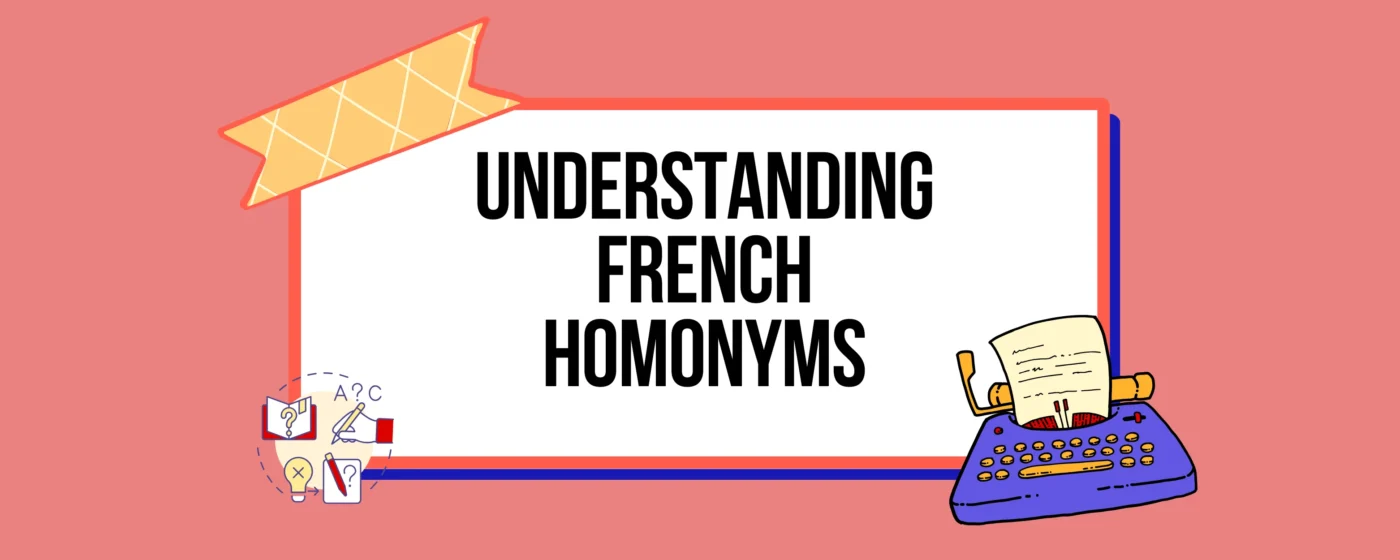Language evolution refers to the process by which languages transform over time. This transformation can be driven by various factors including cultural shifts, technological advancements, and interactions with other languages. Words can acquire new meanings, old meanings can fade, and entirely new words can be created.
French, like all languages, exhibits numerous instances where words have evolved in meaning. Understanding these changes is crucial for language learners and enthusiasts. It provides insights into the cultural and historical contexts that shape a language. Moreover, it helps in grasping the nuances of contemporary usage, thus improving communication and comprehension skills.
Are you ready? Come on, let’s learn to recognize how the meanings of different French words have evolved over time!
Why do words change meanings though?
Word meanings evolve due to several reasons. The most evident one is cultural shifts, where societal values and norms influence language. Technological advancements lead to the introduction of new concepts, resulting in the need for new terminology or altering existing words.
Social changes, such as movements for equality, also reshape language to reflect diversity. Additionally, interaction with other languages contributes to the evolution, as words are borrowed and adapted!
| Word | Historical Meaning | Modern Meaning | Exemple | Translation |
| Ancien | Old | Former | Mon ancien professeur était très sympathique | My former teacher was very nice |
| Balade | Song | Ride/ Walk | Nous allons faire une balade en forêt | We will take a walk in the forest |
| Bureau | Writing desk | Office | Je travaille dans un bureau | I work in an office |
| Carte | Card/ Map | Menu | La carte du restaurant est diverse | The restaurant’s menu is diverse |
| Classe | Category/ Rank | Classroom | La classe de français est intéressante | The French class is interesting |
| Divers | Different | Various | Ils ont des intérêts divers | They have various interests |
| Fameux | Famous/ Renowned | Great | C’était un dîner fameux | It was a great dinner |
| Fort | Strong | Good at something | Einstein était vraiment fort en physique | Einstein was really good at physics |
| Lecture | Act of reading | Reading material | J’ai acheté des nouvelles lectures pour les vacances | I bought some new reading materials for the holidays |
| Louer | To praise | To rent | Elle va louer un studio près de la Tour Eiffel quand elle s’installe en France | She will rent a studio near the Eiffel Tower when she moves to France |
| Lourd | Heavy | Awkward | Il est lourd dans ses blagues | He is awkward with his jokes |
| Mariage | Union | Marriage | Leur mariage était magnifique | Their wedding was magnificent |
| Monnaie | Money | Change | Avez-vous de la monnaie? | Do you have change? |
| Nécessaire | Inevitable | Necessary | Il est nécessaire de prendre des mesures | It is necessary to take these measures |
| Parfait | Completed | Perfect | Ce gâteau est parfait | This cake is perfect |
| Parler | To speak formally | To chat | Nous avons parlé toute la nuit | We talked all night |
| Plume | Feather | Pen | Je vais vous présenter mon ami | I will introduce you to my friend |
| Populaire | Consisting of people | Well-liked | Céline Dion est une chanteuse extrêmement populaire | Celine Dion is an extremely well-liked singer |
| Présenter | To appear | To introduce | J’écris avec une plume | I write with a pen |
| Propre | Own | Clean | Cette maison est très propre | This house is very clean |
| Régler | To govern | To settle | Je dois régler cette facture | I need to settle this bill |
| Rendez-vous | Meet-up | Appointment | J’ai un rendez-vous chez le médecin | I have a doctor’s appointment |
| Réunion | Reunion | Meeting | Nous avons une réunion à 14h | We have a meeting at 2 pm |
| Salé | Salty | Expensive | Ce restaurant est un peu salé | This restaurant is a bit expensive) |
| Serviette | Napkin | Towel | J’ai besoin d’une serviette après la douche | I need a towel after the shower |
| Sympathique | Sympathetic (feeling pity or compassion towards someone) | Friendly | Mon voisin est très sympathique | My neighbour is very nice/ friendly |
| Traduire | To carry across | To translate | Pouvez-vous traduire ce texte? | Can you translate this text? |
| Vilain | Peasant | Naughty | Cet enfant est vilain | This kid is naughty) |
| Voiture | Carriage | Car | Ma nouvelle voiture est rouge | My new car is red |
| Voler | To fly | To steal | Quelqu’un a volé mon portefeuille | Someone stole my wallet |
If you’re fascinated by how words can deceive, check out our blog on Les Faux Amis – French False Friends to learn about French words that can trip you up with their misleading meanings
Stop Guessing, Start Speaking!
With our expert tutors, you’ll master the words you need to speak French confidently!
The Impact of Word Evolution on Language Learning
The evolution of French words significantly impacts language learning. As meanings shift, the learners must adapt to contemporary usage and idiomatic expressions. They must learn to understand and recognize these changes, which will eventually lead to an enhancement of their communication skills.
However, this constantly evolutionary nature of language can easily turn into a daunting challenge for the learners. But you don’t need to worry! Because we bring to you strategies to tackle word evolution in the French language:
1. Comparison is helpful
Yes you heard it right. Comparison can be helpful if done with the goal of a positive outcome. Look up words in etymological dictionaries (Cooljugator being a great beginning resource for this) to see how their meanings have shifted, and note any patterns or commonalities. Further, you can also use apps like Duolingo that include cultural notes and usage tips!
After you have tracked some new words every day (or every week, depending how rigorously you want to keep up with your French language learning) write them down, along with their meanings, contexts, as well as examples of their old and new uses.
2. All work and no play makes Jack a dull boy
Media is your best friend. Yes we said it! Instead of using media just to doomscroll, one can use it as an effective tool for keeping up with language learning as well! Watching French movies and tv shows (For example: The Circle France, Marianne) or even cartoons (like Tintin or Astérix and Obélix) is the easiest way to understand context for modern French language and slang.
Check out our blog 8 Must Watch French Series to Learn French in 2024 for a comprehensive list of French TV series to watch when you’re bored of just studying your way through French!
Conclusion
To conclude, one can say that the evolution of French words and their meanings over time is a testament to the dynamic and ever-changing nature of languages worldwide. Words that once held specific, often narrower, meanings have broadened or shifted entirely, reflecting cultural, social, and technological transformations. For language learners and enthusiasts, understanding these changes is not only fascinating but also crucial for mastering the nuances of contemporary French.
Frequently Asked Questions
1. Are there any specific historical references to word evolutions in the French language?
Ans: Why yes! Many words evolved due to historical events. For example, the word “château” originally meant a fortified castle but now it refers to any grand country house or mansion. Isn’t that interesting?
2. Are such word evolutions limited to historical references or did the French literature and the arts have any role in words whose meanings have shifted due to their use in literary and artistic contexts?
Ans: The works of famous French authors and poets have sometimes influenced the meanings of words. For example, the romanticization of certain terms, such as “sérénade,” has shifted its meaning from just an evening song to any romantic gesture!





